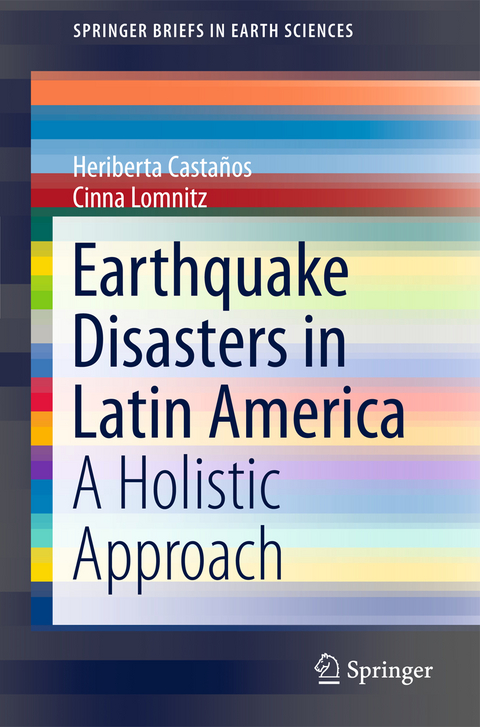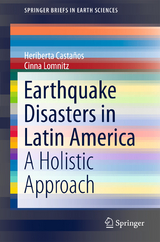Earthquake Disasters in Latin America
A Holistic Approach
Seiten
2012
|
2012 ed.
Springer (Verlag)
978-94-007-2809-7 (ISBN)
Springer (Verlag)
978-94-007-2809-7 (ISBN)
Six major earthquakes in Latin America are used as an example: the general idea is to place disasters in a broad social and regional context. And the 1960 Chile earthquake leads us on a retrospective survey--what has changed in Chile between the two major Chile earthquakes?
This book is an attempt to demonstrate the analytical power of the holistic approach for understanding disasters. Six major earthquakes in Latin America are used as an example: the general idea is to place disasters in a broad social and regional context. Understanding disasters is a way of understanding the social system. The idea is to show that every major disaster is unique and different. Statistical methods may be useful for purposes of risk estimation but modern disasters are "systemic" and complex. In the chapter on the 2010 Chile earthquake we discuss the tsunami and why the system of tsunami alert did not work. The introductory chapter contains some basics of seismology (plate tectonics) and earthquake engineering. The 1985 Mexico earthquake describes why geology is important. Why was Mexico City founded in a lake? Technology must be adapted to the environment, not "imported" from possibly more advanced but different societies. The 1970 Peru earthquake is an example of disaster in a unique environment. Caracas 1967 takes us on a survey of different engineering solutions. And the 1960 Chile earthquake leads us on a retrospective survey--what has changed in Chile between the two major Chile earthquakes? A discussion on Charles Darwin’s observations of the 1835 Chile earthquake provides a fitting summary.
This book is an attempt to demonstrate the analytical power of the holistic approach for understanding disasters. Six major earthquakes in Latin America are used as an example: the general idea is to place disasters in a broad social and regional context. Understanding disasters is a way of understanding the social system. The idea is to show that every major disaster is unique and different. Statistical methods may be useful for purposes of risk estimation but modern disasters are "systemic" and complex. In the chapter on the 2010 Chile earthquake we discuss the tsunami and why the system of tsunami alert did not work. The introductory chapter contains some basics of seismology (plate tectonics) and earthquake engineering. The 1985 Mexico earthquake describes why geology is important. Why was Mexico City founded in a lake? Technology must be adapted to the environment, not "imported" from possibly more advanced but different societies. The 1970 Peru earthquake is an example of disaster in a unique environment. Caracas 1967 takes us on a survey of different engineering solutions. And the 1960 Chile earthquake leads us on a retrospective survey--what has changed in Chile between the two major Chile earthquakes? A discussion on Charles Darwin’s observations of the 1835 Chile earthquake provides a fitting summary.
1. Darwin and plate tectonics.- 2. The great 1960 Chile earthquake.- 3. The 1967 Caracas earthquake.- 4. The 1970 Peru earthquake.- 5. The 1985 Mexico earthquake.- 6. The 2010 Haiti earthquake.- 7. The 2010 Chile earthquake.- 8. A list of significant earthquakes in Latin America.- 9. Conclusions and recommendations.
| Erscheint lt. Verlag | 5.1.2012 |
|---|---|
| Reihe/Serie | SpringerBriefs in Earth Sciences |
| Zusatzinfo | 12 Illustrations, color; 2 Illustrations, black and white; VIII, 65 p. 14 illus., 12 illus. in color. |
| Verlagsort | Dordrecht |
| Sprache | englisch |
| Maße | 155 x 235 mm |
| Themenwelt | Naturwissenschaften ► Biologie ► Ökologie / Naturschutz |
| Naturwissenschaften ► Geowissenschaften ► Geologie | |
| Naturwissenschaften ► Geowissenschaften ► Geophysik | |
| Sozialwissenschaften ► Soziologie | |
| Schlagworte | Catastrophe Theory • Disaster studies • Earthquake hazard • risk governance • Sociology of risk • vulnerability |
| ISBN-10 | 94-007-2809-3 / 9400728093 |
| ISBN-13 | 978-94-007-2809-7 / 9789400728097 |
| Zustand | Neuware |
| Informationen gemäß Produktsicherheitsverordnung (GPSR) | |
| Haben Sie eine Frage zum Produkt? |
Mehr entdecken
aus dem Bereich
aus dem Bereich
Methoden – Lösungen – Anwendungen
Buch | Hardcover (2025)
Hanser (Verlag)
CHF 69,95




